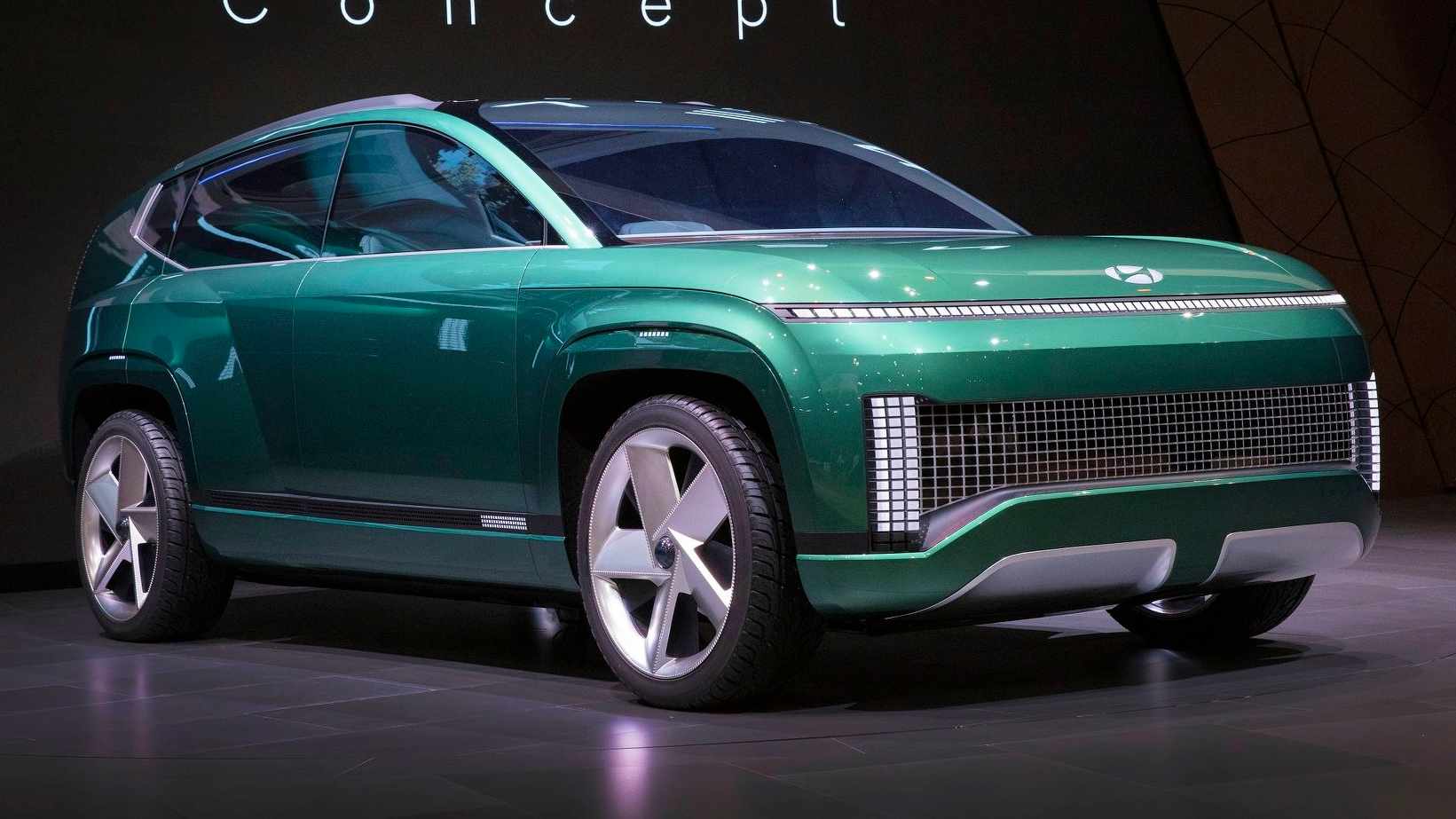Hyundai Ioniq Seven electric SUV concept debuts in LA with sofa-style third row, 77-inch roof display- Technology News, Firstpost
tech2 News StaffNov 18, 2021 12:05:40 IST
It’s not just Kia that has unveiled a new electric SUV concept at the LA Auto Show 2021 – parent company Hyundai has also taken the wraps off its brand-new electric vehicle (EV) concept, and it’s named the Hyundai Ioniq Seven. Billed a ‘category-bending’ proposition, the Hyundai Ioniq Seven is pretty radical even by concept standards, and while it looks like it’s far away from being production ready at this point, it does provide a glimpse of Hyundai’s future flagship electric SUV – or SUEV, as Hyundai is calling it.

The Hyundai Ioniq Seven is larger than Hyundai’s biggest production SUV yet, the Palisade. Image: Hyundai
Unlike the Kia EV9 (which it shares its mechanicals with), the Hyundai Ioniq Seven adopts a notably different design language. While the EV9 is all angular and sharp-edged, the Ioniq Seven is softer and more rounded, without compromising on visual muscle. At around five metres in length, two metres in width and 1.8 metres in height, the Ioniq Seven is bigger than Hyundai’s biggest combustion engine SUV at present – the Hyundai Palisade – so it is an imposing SUV and will have plenty of presence. Its wheelbase (3,200 mm) is substantially longer than the Palisade’s, and is almost identical to that of the long-wheelbase Mercedes-Benz S-Class.

The 3,200 mm wheelbase is almost identical to that of the long-wheelbase Mercedes-Benz S-Class. Image: Hyundai
Exterior highlights include the ‘Parametric Pixel’ lights up front, chunky five-spoke alloys with integrated ‘Active Air’ flaps, which deploy or retract for brake cooling and low-drag purposes respectively, retracting cameras that replace wing mirrors, beefy wheel arches, pillarless coach doors, a sloping roofline and an almost-bread van-like tail section, which ends with an all-glass tailgate encased by pixel-like tail-lights. All in, the Ioniq Seven looks quite interesting on the outside.

All-glass tail gate encased by pixel-style LED tail-lights. Image: Hyundai
It’s on the inside where the Ioniq Seven is truly pathbreaking – and even more concept-like, which is to say that most of these elements are unlikely to make it to the production model. While it is a three-row SUV, Hyundai has chosen to break away from the established seating layout and equipped the SUV with swivelling lounge-style chairs for the driver and front passenger (which can also be moved fore and aft), a dedicated footrest housing a 27-inch screen as well as a ‘shoe care’ shelf and a curved sofa-style seat that stretches from the third row to the second row.

No steering wheel inside the Ioniq Seven – space freed up used for full-width display and storage shelf. Image: Hyundai
There is no steering wheel inside the Ioniq Seven – it’s replaced by a joystick that stows away into the driver’s seat when not needed, and the space liberated on the dashboard is used for a full-length infotainment display as well as a storage shelf. Also part of the package is a giant, 77-inch ceiling display for entertainment purposes, a built-in refrigerator, tube-type ambient lighting lamps placed in the doors, aircraft-style interior ventilation (with horizontal and vertical air flow controls to prevent cross-contamination between vehicle occupants), a panoramic air purifier as well as UVC lighting, which engages once passengers step out, to sterilise the vehicle’s interior.

The virtual sunroof doubles up as a 77-inch entertainment screen. Image: Hyundai
To lend it more of a home interior feel, Hyundai has used materials such as copper, bamboo wood, mineral plaster and recycled fabric, and also included shelves to store odds and ends. It’s safe to say that while a lot of these elements are promising and forward-looking, safety regulations may prevent them from carrying over into production.

Traditional third row makes way for curved sofa-style seating. Image: Hyundai
Based on the scalable E-GMP architecture that also underpins the Hyundai Ioniq 5, Kia EV6 and the EV9 Concept, the Hyundai Ioniq Seven concept is also said to have a range of over 480 kilometres on a full charge, and thanks to its 800-volt architecture, the Seven is said to go from 10 to 80 percent charge in just 20 minutes when plugged into a 350 kW DC fast charger. The production version of the Ioniq Seven is likely to get a large battery (close to 80 kWh capacity) and a dual-motor setup with varying power outputs, depending on the variant.
It remains to be seen if the production-spec Ioniq Seven – expected to debut in 2023 – will replace any of Hyundai’s existing combustion engine SUVs, or if it will be offered as a standalone model under the Ioniq sub-brand. At present, the only Hyundai EV on sale in India is the Kona Electric, and while there’s no official communication on the same, the production Ioniq Seven may just end up being introduced in India after its global launch, as it would be the perfect halo model for Hyundai’s SUV portfolio.
; if(!f._fbq)f._fbq=n;n.push=n;n.loaded=!0;n.version='2.0'; n.queue=[];t=b.createElement(e);t.async=!0; t.src=v;s=b.getElementsByTagName(e)[0]; s.parentNode.insertBefore(t,s)}(window,document,'script', 'https://connect.facebook.net/en_US/fbevents.js'); fbq('init', '259288058299626'); fbq('track', 'PageView');
For all the latest Technology News Click Here

